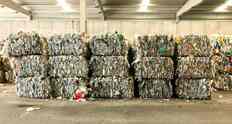- The Tarragona Ecoplant will receive over €800 million investment to produce renewable methanol from waste.
- The plant will process 400,000 tons of waste annually, producing 240,000 tons of renewable fuels and products.
- Scheduled to start in 2029, the project will create 340 jobs and 2,800 during construction.
- The EU Innovation Fund supports the project, expected to cut 3.4 million tons of CO2 emissions in ten years.

Investment and Location
Repsol's Board of Directors has approved an investment exceeding €800 million for the Ecoplant in Tarragona. This facility will be the first in Europe to produce renewable and circular methanol from waste through gasification, a process developed by Enerkem, a Repsol partner.
Production Capacity and Technology
The plant will process up to 400,000 tons of municipal solid waste annually, converting it into 240,000 tons of renewable fuels and circular products. The renewable methanol will be derived from organic waste, while circular products will come from non-organic waste, such as non-recyclable plastics.
Timeline and Employment
Set to begin operations in 2029, the Ecoplant will create 340 direct, indirect, and induced jobs, with an additional 2,800 jobs during the construction phase. The facility will be integrated into Repsol's industrial complex in Tarragona, leveraging existing infrastructure to transform the center into a multi-energy hub.
EU Support and Environmental Impact
The European Union has selected the Ecoplant for funding from the Innovation Fund program, recognizing its potential to reduce emissions and its innovative approach. The plant is expected to cut 3.4 million tons of CO2 emissions over its first decade of operation.
Decarbonizing Transport
The Ecoplant will contribute to the EU's goal of reducing carbon intensity in maritime transport by producing renewable methanol, a key component alongside renewable diesel. This methanol will also be used in road transport, renewable gasoline and diesel production, and sustainable aviation fuel.
Future Prospects
Repsol aims to lead renewable fuel production in the Iberian Peninsula, targeting 1.5 to 1.7 million tons annually by 2027 and up to 2.7 million tons by 2030, including renewable hydrogen and biomethane.

